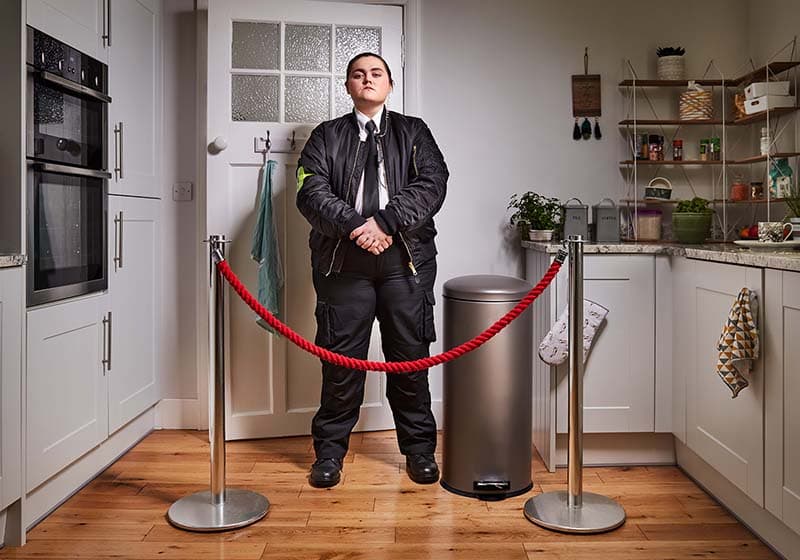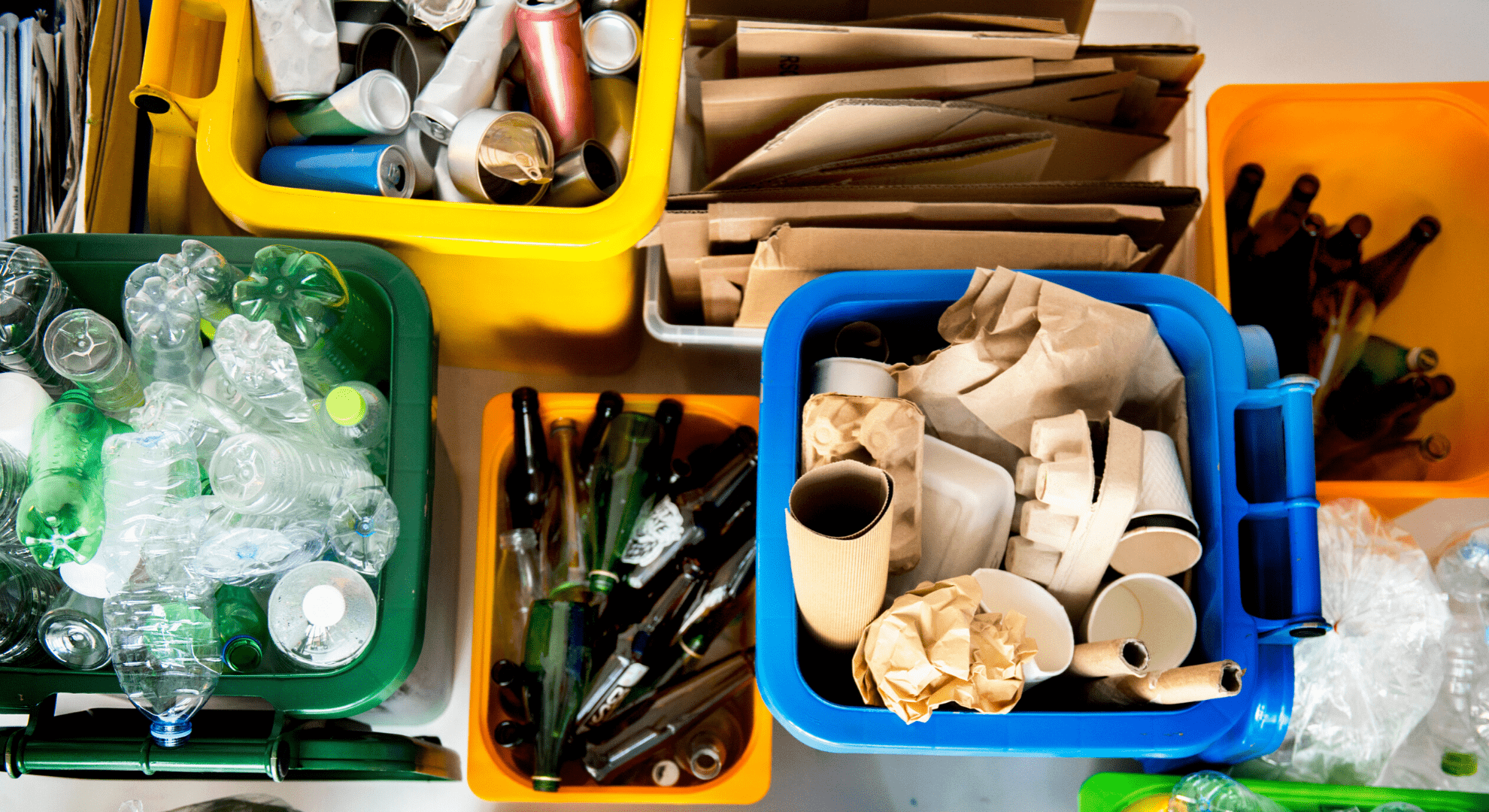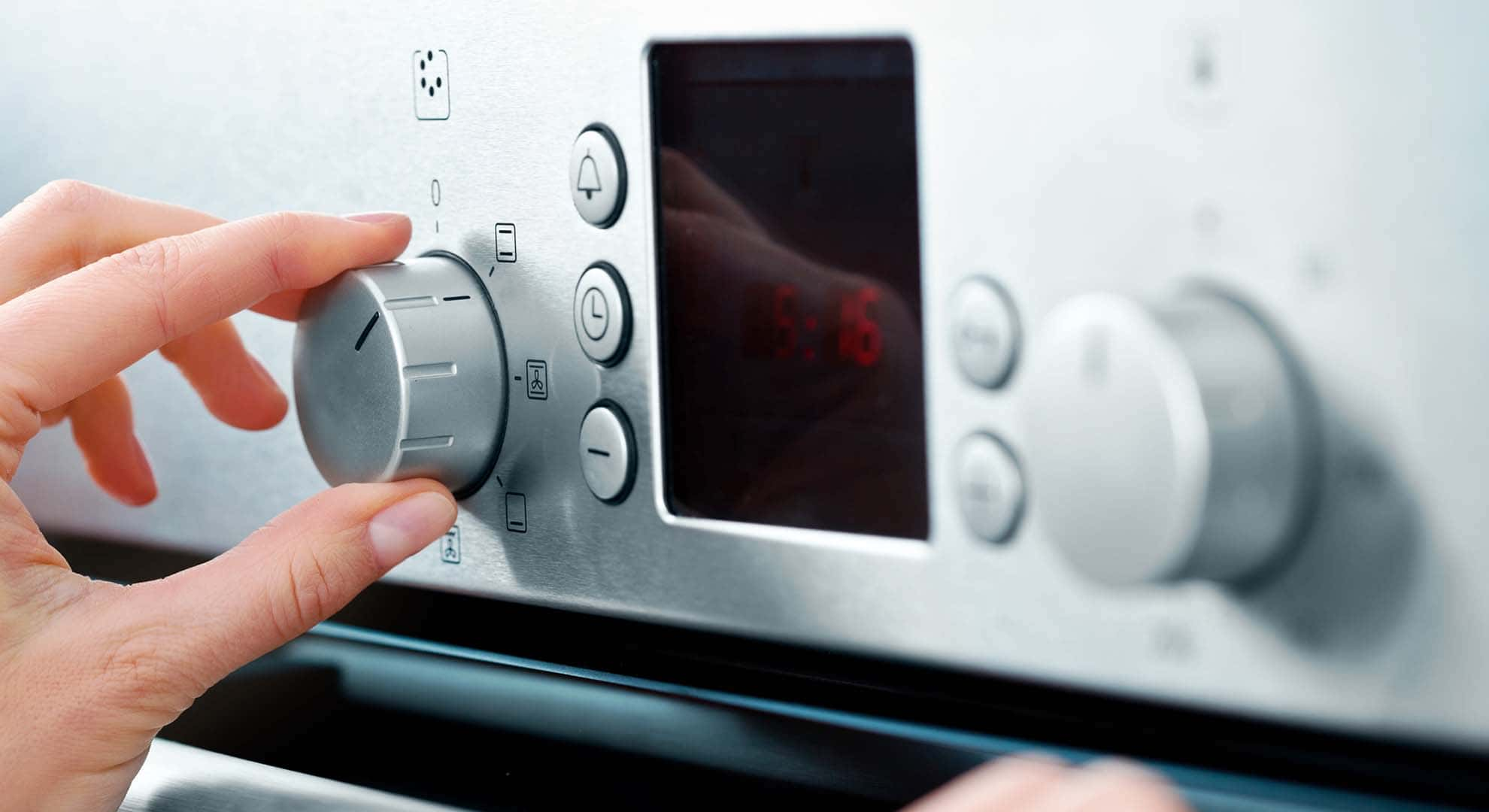
Recycle Week 2023
Our Recycle Week 2024 campaign, 'Don't let it go to waste' can be downloaded from our partners site.
16 - 22 October 2023 - it’s time to get recycling sorted!
This Recycle Week, we'll be sharing a bucketful of information to help you to recycle more of the right things more often using the Recycling Sorter. It's the digital recycling tool allows you to search for what items can be recycled, and in which colour of bin, in any Scottish local authority. Helping to make it easier to do our bit for the planet.
When it’s done right, recycling is one of the easiest everyday actions we can all take to reduce our carbon footprint. That’s why it’s time to get recycling sorted!
We’re encouraging using the Recycling Sorter to help navigate recycling confusion around common household items. Now that Scots can enjoy nightlife once again, our content features a doorwoman guarding the non-recyclable waste bin.
When approaching the bin with an item that could be recycled – the doorwoman informs of the no entry policy - ‘no the night pal - we don’t just let anything in the general waste bin’.
Get involved with Recycle Week
From 16 - 22 October 2023 our social media channels and website will be packed full of content celebrating Recycle Week and the Recycling Sorter, so get sharing with your friends and family.
Use #RecycleWeek and #RecyclingSorter to share on your social media channels and to take a look at what others are doing.
Take on the Recycle Week challenge!
We all like to think we’re doing our bit by recycling but often many household items mistakenly end up in the wrong bin. Are you really recycling everything that you can? Are there any items you’re not sure about?
Below is a list of common household items that often make their way into the wrong bin. Take the Recycle Week challenge by using our Recycling Sorter to check how to recycle them in your local area. Any surprises? Let us know how you get on using the hashtags #RecycleWeek and #RecyclingSorter on social media.
- Shampoo bottles
- Bleach bottles
- Deodorant cans
- Toilet roll tubes
- Juice cartons
Recycling Sorter FAQs
What is the Recycling Sorter tool?
The Recycling Sorter is a digital tool, created by Zero Waste Scotland, that allows you to find out what items can be recycled in any Scottish local authority, in a few simple steps. It also tells you which colour of bin you should put different items into for recycling.
Why has the Recycling Sorter been launched?
When it’s done right, recycling is one of the easiest everyday actions we can take to reduce our carbon footprint.
We know however that recycling can sometimes be confusing, especially if you are moving between different Scottish local authority areas, for example between home, work, student accommodation, or even going on holiday.
The Recycling Sorter holds the recycling information for every local authority in one place, making it easier to find the information you need on what can be recycled and in which colour of bin.
The Recycling Sorter saves you having to find information on individual local authority websites, whilst cutting through the confusion of what can be recycled in a specific area.
The tool aims to simplify and bring clarity to recycling in Scotland, helping households to recycle more of the right things in the right places, no matter what area of Scotland they’re in or visiting.
How do I use it?
The Recycling Sorter is a simple tool to use. You can find out what you can recycle in any Scottish local authority by following the two steps below:
- select your local authority from the drop-down menu on the left
- tell us whether you have your own kerbside bin, or you share it with neighbours
The Recycling Sorter will do the rest.
It will display the list of bins used by your local authority and broadly what items they take.
When you click on a bin colour, you will see a list of items you can put in that bin and a list of those you shouldn’t put in.
What happens if a local authority introduces a service change?
Local authorities are encouraged to email any service changes to support@recycleforscotland.com. Zero Waste Scotland will then update the system and any changes will pull through onto the live site with immediate effect.
Why is recycling important?
Recycling is one of the easiest things we can all do at home to tackle climate change. If Scottish households recycled just 10% more of their waste, we would save over 148,000 tonnes of CO2e, the equivalent of over 22,000 flights around the world.
Scotland is also moving towards a more circular economy – one in which products and services are made to last and nothing is wasted. Recycling has a key part to play. By recycling as much as we can, we divert valuable materials from landfill or incineration, benefiting the environment and the economy.
As a nation, Scotland is working towards ambitious targets on recycling set by the Scottish Government: with 70% of waste recycled or prepared for reuse and no more than 5% of all waste to go to landfill by 2025.
Putting the right items in the right bins is important. The wrong items being put in a recycling bin are called contamination and this can potentially lead to recyclable materials being sent to landfill.
What are Scotland’s national waste targets and where are we with them?
- Reduce total waste arising in Scotland by 15 per cent against 2011 levels
- Reduce food waste by 33 per cent by 2025
- Recycle 70 per cent of remaining waste
- Send no more than five per cent of remaining waste to landfill
Scotland has increased its recycling rate tremendously over the last decade. However, progress has slowed and reversed according to the latest SEPA data. In the climate crisis, this is unacceptable – as individuals, and businesses, we really need to do better.
The overall 15% reduction in waste target varies largely due to the output of the construction sector. There are years when we would make the target and others where an increase in construction waste means the overall national figures are adversely affected. To achieve our target, we should focus on reducing waste outside the construction sector to help accommodate its fluctuations, while also encouraging far more reuse of materials within the construction industry.
The 5% landfill target is very challenging but the volume being sent is reducing and we are working with the Government and local authorities to explore ways we can accelerate progress on this.
More does still need to be done to improve our chances of achieving these targets. That is why we are looking at projects such as extended producer responsibility, the deposit return scheme and food waste reduction action plan. Each one is vital in helping us reduce our waste figures.
Whilst the individual targets are in the process of being addressed, we are also working hard to increase awareness of the circular economy and the benefits it can bring. This isn’t just about waste – it’s about materials we use generally, reducing the environmental impact of the products and services we use, and benefitting from the economic opportunities of doing things better.
What is the recycling process in Scotland?
All local authorities in Scotland operate a kerbside recycling service. Most kerbside collections are made by council staff in council vehicles, although some contract out part, or all, of their collections to private companies.
Most households in Scotland can recycle paper and card, plastic bottles, food tins and drinks cans, glass bottles and jars, and food waste via their kerbside recycling service. Some can also recycle plastic tubs and pots, cartons, and foil food trays.
All local authorities in Scotland also operate Household Recycling Centres, at which a wider variety of materials can be recycled – including wood, garden waste, textiles, and Waste Electrical and Electronic Equipment (WEEE).
It is up to individual councils to decide what is best for their local area in terms of recycling provision and collection, in close consultation with residents.
Recyclable items can be collected from Scottish households in three different ways. There are kerbside 'sort' schemes where recyclables are sorted into their respective materials on the lorry at the kerbside, and co-mingled collections where recyclables are put into one compartment on the lorry before being taken to a Materials Recovery Facility (MRF) and sorted. Alternatively, specific materials can be collected from the kerbside separately. This approach is most common for paper and glass.
At a MRF, mixed recycling is sorted and separated into different types of materials by hand or machine (or both) before being sent for further processing and use by manufacturers who make it into new products.
Some local authorities operate their own MRFs, but these are more frequently operated by private companies and contracted by local authorities. One MRF can serve more than one local authority.
Once collected and sorted, recycled materials become valuable commodities in the worldwide market.
Why do different local authorities in Scotland recycle different items?
The best thing that householders can do is follow the advice from their local authority as to what goes in what bin. The Recycling Sorter is the one-stop place to check this information.
This will help boost Scotland’s recycling industry as contaminant-free material is far more recyclable and attractive to recyclers.
Each of Scotland’s 32 local authorities has its own system for recycling and the list of materials that can be recycled can differ. We recognise that these differences can sometimes be confusing for the public and this has led to the introduction of the Charter for Household Recycling which aims to simplify recycling across the country. Most Scottish councils have now signed up to the Charter.



